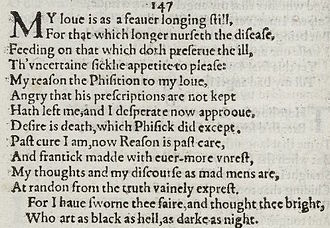| Sonnet 147 | |||||||
|---|---|---|---|---|---|---|---|
 Sonnet 147 in the 1609 Quarto | |||||||
| |||||||
Sonnet 147 is one of 154 sonnets written by English playwright and poet William Shakespeare. Sonnet 147 is written from the perspective of a poet who regards the love he holds for his mistress and lover as a sickness, and more specifically, as a fever. The sonnet details the internal battle the poet has between his reason (or head) and the love he has for his mistress (his heart). As he realizes his love is detrimental to his health and stability, perhaps even fatal, the poet's rationality attempts to put an end to the relationship. Eventually, however, the battle between the poet's reason and his love comes to an end. Unable to give up his lover, the poet gives up rationale and his love becomes all consuming, sending him to the brink of madness.
- ^ Pooler, C[harles] Knox, ed. (1918). The Works of Shakespeare: Sonnets. The Arden Shakespeare [1st series]. London: Methuen & Company. OCLC 4770201.